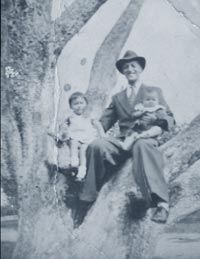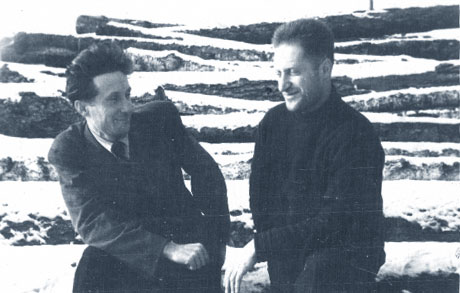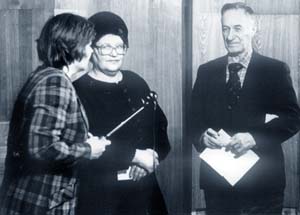









 I was born in 1918. For some time I lived in Manchuria, in the town of
Chimgen; I went to the Russian school. From 1929 to 1945 I learned Japanese.
Afterwards I worked or, as they would say at that time, served for a company
called Churin. I made translations from the Japanese and Chinese languages into
Russian. Later I worked in Chumchun (1934-1935), Mukdyn (1936-1937) and then,
from 1937, in a three-storeyed building in Kharbin, right at the landing place.
In 1945 the Soviet army marched in. Japan surrendered on the 16th of August.
After August 20, the Soviet troops held a parade, and on the 28th of August
workers of the “SMERSh”, the special counter-intelligence directorate of the
Soviet Armed Forces, came for me. They took me somewhere. And thus, 10 years and
10 months passed by. I had to leave my wife behind in one of the suburbs of the
district of Chianhe, Kharbin. She gave birth to our son after my arrest.
I was born in 1918. For some time I lived in Manchuria, in the town of
Chimgen; I went to the Russian school. From 1929 to 1945 I learned Japanese.
Afterwards I worked or, as they would say at that time, served for a company
called Churin. I made translations from the Japanese and Chinese languages into
Russian. Later I worked in Chumchun (1934-1935), Mukdyn (1936-1937) and then,
from 1937, in a three-storeyed building in Kharbin, right at the landing place.
In 1945 the Soviet army marched in. Japan surrendered on the 16th of August.
After August 20, the Soviet troops held a parade, and on the 28th of August
workers of the “SMERSh”, the special counter-intelligence directorate of the
Soviet Armed Forces, came for me. They took me somewhere. And thus, 10 years and
10 months passed by. I had to leave my wife behind in one of the suburbs of the
district of Chianhe, Kharbin. She gave birth to our son after my arrest.
On September 30th we were transported to the Soviet-Union. First they took us to Gvordeiskiy or Nikolsk-Ussuriysk, as the place was called earlier. From there we were taken to the Ural Mountains in December, to the Vostok-Ural Camp Cpmplex, the Tavdalag. They sew a number (I-776) right to the back of my jacket and the left shirt front. The “I” marked me as a foreigner. The Chelyabinsk Tractor Works provided us with pea-jackets, hemp shoes and rubber low shoes. However, they did not look like laced shoes at all, they were nothing else but simple soles, which we had to wrap around our feet. It was an entirely traditional, third-hand footwear, made for long use.
During the winter we had to walk around in bast shoes. There were prisoners among us, who were able to plait such shoes. We received a new pair every day, for each time a day drew to a close, they had fallen into pieces for sure. Later they began to supply felt boots, although they looked already very shabby, had been worn a hundred of times already and again and again repaired and sewn together.
Every day they gave us a guaranteed bread ration of 600 grams. Upon over-fulfillment of the work norm we would receive 750, 850 or maximum 950 grams, but those who did not work had to do with 300 grams only. Apart from this bread ration the prisoners were issued lentils, groats, some kind of a thin pearl barley soup and mush. They forced us to drink a broth made of fir needles. It was considered an effective means against scurvy. We had to go and gather the needles ourselves.
The barracks were intended for 120-150 prisoners. They were equipped with two storeyed, continuous bed boards. There was a strict regime – a step to the left or to the right was considered an escape attempt – and the escort would fire without warning. The prisoners were simply executed.
In the Tavdalag Japanese, Chinese and Koreans were serving their sentences. When we were taken away from Kharbin, one of the Koreans took to flight from the train. At the next station the train stopped, and they arrested another man instead. They asked hm for his family name. He told them, and they immediately shouted at him: “What did you say? Why are you telling lies?” – One prisoner had ran away, so that the number of prisoners travelling on this transport was incorrect. That is why they seized this man, in order to make the number of prisoners correspond to their official list again. It did not make any difference to them, who the person was: anyway, it was just an individual with two arms, two legs and a head being able to work just like the escapee.
In 1946, in the wintertime, we were working in the woods; we had to fell trees. And in the spring, when we had become so exhausted of hunger and emaciation that we were merely able to move our legs, they took me to the small infirmary to give me the possibility to recover. I was almost 28 years old at that time. Later they sent me to work for a loading unit.
In 1947 they finally sent me my written sentence (the judgement had already been pronounced in 1945) from which I learned that I had been sentenced to 15 years on section 58, para 4, 6, 10, 11 and 19. Well, 15 years, I would not be able to survive, and so I tried to escape, together with Chikizubov, Victor Popov and Nikolai Chaev, who was not one of us; he was a local. We jumped over the fence, which surrounded the camp zone, and ran away. We had not prepared ourselves well. If they want to kill us, just let them! However, it is good that we met the dog handler here in the taiga. He had been a real ruffian in earlier times; as we can see, he is armed, while we do not even dispose of an axe. He asks us: “Do you have something to smoke?” And we reply: “No, we don’t”. He threw some cigarettes over to us. We sat down for a while. He asks us, where we intend to go, and looking at the sun I say: “This direction. This way into the taiga is the shortest one”.
We imagined, how it would be to walk through the Altai Mountains. We set off and very soon reached the railroad line, where guards with machine pistols went round. When they noticed us, the whole area was encircled at once. They seized me and Tiazhev and began to beat us. The dog handler tried to defend us. He would not allow them to beat us up. They put us in the isolator. The only “furniture” there were wooden poles covered with little twigs.
The gave us 300 grams of bread per day. We were kept in this place for a day, two, a whole week. Then they called us to attend our trial, during which they extended my term once again.
They put us into a separate barracks, where they were exclusively keeping especially dangerous recidivists. There were so many bugs inside the barracks! No fleas or lice, but hosts of bugs! While I stayed there, they assaulted one of the other prisoners, pinned him to the ground and gouged out his eyes. They said he had done something wrong and needed to be punished for it. Two pressed them down to the floor, the third one tore out his eyes – publicly. And how the abused us – calling us fascists.
Then, one day, the barracks were closed for degassing, in order to smoke out the bugs. We were taken to the normal zone, where they had no intensified regime. There we declared our intention to go on hunger strike. We were four strikers altogether. We neither drank nor ate for seven days and nights, a so-called “dry hunger strike” (i.e. without anything to drink, because this was considered the most tormenting method; translator’s note). Our urine looked all bloody. They took us to the infirmary on their arms. A certain Major Polivin or Bolivin fed us up by means of chicken meat and broth. We did not know whether he was from Estonia or somewhere from the West. Having stayed there for about a month, we had quite well recovered and were taken back to the normal zone.
I do recall that it was autumn, when I came to the forced labour camp. Slush! We had to go to the guardroom in bast shoes. Take off your clothes, do some exercises! This was their method to frisk the prisoners, in order to find out, whether they were carrying forbidden objects with them. Well, then get dresed agin and go off into the taiga.
When I was in Asanka, I broke one ofmy legs when loading wood. Doctor Karmalenko gave me medical treatment. He was said to have participated in the murder of Maxim Gorkiy, who had died from poisening. He cured me within a short period of time, and until today I have never had any problems with the leg again, although it had been broken twice – a simple and a compound fracture.
In Asanka we were about 1.500 inmates. Some man, however, never reached the place – they died ontheir way to Asanka. On the waggon I as transported on, an old man died just beside me. Some other prisoners perished, too. In the camp up to ten prisoners died every day. They were buried behind the zone. I do remember Maksimenko. He was such a healthy-looking, strong guy. He of all people decided to attempt to escape. They killed him. I saw his dead body myself.
 In 1948 they inflicted a new punishment on me – 25 years and 5 + 5, i.e. 5
years of internal exile + 5 years of political and individual civil
disfranchisement, although I was not a citizen of the Soviet-Union. Sections
58-4, 58-3 for having escaped. This was later changed into section 82 –
attempt to escape. And then they sent me even deeper into the taiga.
In 1948 they inflicted a new punishment on me – 25 years and 5 + 5, i.e. 5
years of internal exile + 5 years of political and individual civil
disfranchisement, although I was not a citizen of the Soviet-Union. Sections
58-4, 58-3 for having escaped. This was later changed into section 82 –
attempt to escape. And then they sent me even deeper into the taiga.
There was one single barracks only. We called it “Blinov’s Castle”. The place was called Tavda, Sverdlovsk region. Some time in the late 1940s they took us to the Taishetlag, from there to Vikhorevka and from Vikhorevka to the labour colony No. 043. Finally, they transferred me to Taishet as a construction worker. I was leading a brigade of 50 men. During the first time they would allow us to leave the zone, for we were to build Taishet, to be more exact: we renovated the so-called “colossus”, the Palace of Culture. Later, they took me to the Central Repair Workshop, where I worked as a brigade leader, too. Late in 1953 they sent as away from this place, taking us back to Vikhorevka in 1954. There we worked for the procurement of food and had to fell trees.
They began to release the prisoners. The first Chinese and Japanese were allowed to leave, but we still had to stay in the camp. My brothers, sisters and my mother knew that I was alive. They were happy, packed up a few things and came to this virgion soil of Barabinsk, in order to see me. When the release commission arrived, I was the very first they set free. There had been an amnesty. All prisoners were acquitted of their charges. I asked: “And where may I go now?” – And they replied: “Wherever you like to. If you want to go back to Manchuria, well, then go!” – Some of the prisoners, like Keshka Afonov and Ageev, followed this suggestion. My mother, however, succeeded in finding my sister and decided to move to Cheremchovo.
My wife, Soya Aleksandrovna Nikolskaya, lives in Nakhodka today. I joined my mother on her trip to Cheremchovo, where we lived for a while. The my mother learned about her sister’s, my aunt’s, place of residence, and we all went to Krasnoyarsk. As a foreigner I had to get registered regularly every three months. The registration office was situated in a little house in Dictatorship Street No. 23.
 Some time in the 1960s I made an application for the Soviet citizenship, and
already on November 3rd I received my Russian passport and a military passport
here in Krasnoyarsk. My mother, as well as my brothers and sisters had adopted
the Russian citizenship, when they were still living in Kharbin, but I had been
living as a stateless person for three years, because I did not want to become a
Soviet citizen. I was allowed to depart at any time convenient.
Some time in the 1960s I made an application for the Soviet citizenship, and
already on November 3rd I received my Russian passport and a military passport
here in Krasnoyarsk. My mother, as well as my brothers and sisters had adopted
the Russian citizenship, when they were still living in Kharbin, but I had been
living as a stateless person for three years, because I did not want to become a
Soviet citizen. I was allowed to depart at any time convenient.
For the past three years I am engaged in a lawsuit with Nikolai Grigorevich Bandur, the director of the Specialized Automobile Center. He insulted me, called me a traitor to my fatherland. But how can I be a traitor to my fatherland? And this is why I took this matter to court. As long as there is no court decision, I am not going to pursue my work.
Recorded by Aleksey Babiy, Yelena Porokhniavaya,
Krasnoyarsk “Memorial” Organization
Fotos